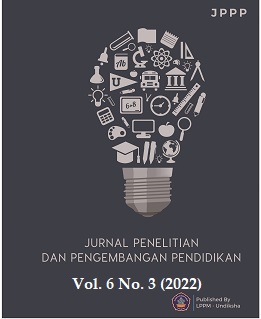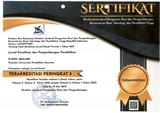Pembelajaran Project-Based Learning Berbantuan Penilaian Teman Sebaya dalam Pembelajaran Daring Meningkatkan Kemampuan Berpikir Kritis Mahasiswa
DOI:
https://doi.org/10.23887/jppp.v6i3.54342Keywords:
PjBL, Teman Sebaya, Kemampuan berpikir Kritis, Pembelajaran daringAbstract
Pembelajaran daring mempunyai kelehaman yaitu mahasiswa merasa bosan karena proses pembelajaran monoton dan kurang menarik. Sehingga mahasiswa tidak tertarik belajar dan menyelesaikan pembelajaran yang dilakukan di e-learning. Penelitian ini bertujuan untuk menganalisis pengaruh pembelajaran project-based learning (PjBl) berbantuan penilaian teman sebaya dalam pembelajaran daring untuk meningatkan kemampuan berpikir Kritis mahasiswa. Rancangan penelitian ini menggunakan rancangan posttest only control group design. Populasi penelitian ini adalah seluruh mahasiswa semester II PGSD yang ada di Singaraja yang berjumlah 170 mahasiswa. Metode pengumpulan data menggunakan tes. Teknik analisis statistik deskriptif digunakan untuk mendeskripsikan data yang diperoleh. Pengujian hipotesis digunakan adalah uji-t untuk menguji tingkat signifikan dari pengaruh variabel independen secara parsial terhadap variabel dependen. Uji dilaksanakan dengan langkah membandingkan t hitung dengan t tabel. Hasil analisis menunjukkan bahwa nilai Sig. yang diperoleh kurang dari 0,05. Hal ini berarti terdapat perbedaan kemampuan berpikir kritis mahasiswa yang dibelajarakan project-based learning (PjBl) berbantuan teman sebaya dengan mahasiswa yang dibelajarkan tanpa pembalajaran project-based learning (PjBl) berbantuan teman sebaya. Implikasi penelitian ini diharapkan dengan adanya model pembelajan ini mahasiswa akan belajar lebih aktif dalam membangun pengetahunnya sendiri yang berdampak terhadap kemampuan berpikir kritis.
References
Alias, M., Masek, A., & Salleh, H. H. M. (2015). Self, Peer and Teacher Assessments in Problem Based Learning: Are They in Agreements? Procedia - Social and Behavioral Sciences, 204(November 2014), 309–317. https://doi.org/10.1016/j.sbspro.2015.08.157. DOI: https://doi.org/10.1016/j.sbspro.2015.08.157
Andersen, T., & Watkins, K. (2018). The value of peer mentorship as an educational strategy in nursing. Journal of Nursing Education, 57(4), 217–224. https://doi.org/10.3928/01484834-20180322-05. DOI: https://doi.org/10.3928/01484834-20180322-05
Arikunto, S. (2015). Dasar-Dasar Evaluasi Pendidikan. Bumi Aksara.
Barta, A., Fodor, L. A., Tamas, B., & Szamoskozi, I. (2022). The development of students critical thinking abilities and dispositions through the concept mapping learning method – A meta-analysis. Educational Research Review, 37, 100481. https://doi.org/10.1016/j.edurev.2022.100481. DOI: https://doi.org/10.1016/j.edurev.2022.100481
Davut Gul, M., & Akcay, H. (2020). Structuring a new socioscientificissues (SSI) based instruction model: Impacts on pre-service science teachers’ (PSTs) critical thinking skills and dispositions. International Journal of Research in Education and Science, 6(1), 141–159. https://doi.org/10.46328/ijres.v6i1.785. DOI: https://doi.org/10.46328/ijres.v6i1.785
Fauzia, N. L. U., & Kelana, J. B. (2021). Natural Science Problem Solving in Elementary School Students Using the Project Based Learning (PjBL) Model. Jurnal Ilmiah Sekolah Dasar, 4(4), 596–603. https://doi.org/10.23887/jisd.v4i4.28377.
Gabriele, K. M., Holthaus, R. M., & Boulet, J. R. (2016). Usefulness of Video-Assisted Peer Mentor Feedback in Undergraduate Nursing Education. Clinical Simulation in Nursing, 12(8), 337–345. https://doi.org/10.1016/j.ecns.2016.03.004. DOI: https://doi.org/10.1016/j.ecns.2016.03.004
Han, J.-S., Baek, H. C., & Jeong, A.-S. (2015). The Effects of Psychiatric Nursing Simulation on Anxiety and Self-confidence about Clinical Placement of Nursing Students. Journal of the Korea Academia-Industrial Cooperation Society, 16(11), 7812–7819. https://doi.org/10.5762/kais.2015.16.11.7812. DOI: https://doi.org/10.5762/KAIS.2015.16.11.7812
Hart, C., Da Costa, C., D’Souza, D., Kimpton, A., & Ljbusic, J. (2021). Exploring higher education students’ critical thinking skills through content analysis. Thinking Skills and Creativity, 41(May), 100877. https://doi.org/10.1016/j.tsc.2021.100877. DOI: https://doi.org/10.1016/j.tsc.2021.100877
Indriani, L., Haryanto, H., & Gularso, D. (2022). Dampak Model Pembelajaran Problem Based Learning Berbantuan Media Quizizz terhadap Kemampuan Berpikir Kritis Mahasiswa. Jurnal Penelitian Dan Pengembangan Pendidikan, 6(2), 214–222. https://doi.org/10.23887/jppp.v6i2.48139. DOI: https://doi.org/10.23887/jppp.v6i2.48139
Jalili, M., & Shishavan, H. B. (2020). Responding to student feedback: Individualising teamwork scores based on peer assessment. ArXiv, 1(August), 100019. https://doi.org/10.1016/j.ijedro.2020.100019. DOI: https://doi.org/10.1016/j.ijedro.2020.100019
James, S., Lanham, E., Mak-Hau, V., Pan, L., Wilkin, T., & Wood-Bradley, G. (2018). Identifying items for moderation in a peer assessment framework. Knowledge-Based Systems, 162(January), 211–219. https://doi.org/10.1016/j.knosys.2018.05.032. DOI: https://doi.org/10.1016/j.knosys.2018.05.032
Jiang, Y. (2022). Evaluation of pedagogical impact of Business English textbooks on teaching critical thinking skills. Heliyon, 8(11), e11419. https://doi.org/10.1016/j.heliyon.2022.e11419. DOI: https://doi.org/10.1016/j.heliyon.2022.e11419
Kurniawan, H. R., Elmunsyah, H., & Muladi, M. (2018). Perbandingan Penerapan Model Pembelajaran Project Based Perbandingan Penerapan Model Pembelajaran Project Based Learning Dan Think Pair Share Berbantuan Modul Ajar Terhadap Kemandirian Dan Hasil Belajar Siswa Kelas XI di SMKN 3 Malang. Jurnal Pendidikan (Teori Dan Praktik), 3(2), 80. https://doi.org/10.26740/jp.v3n2.p80-85. DOI: https://doi.org/10.26740/jp.v3n2.p80-85
Liang, H.-Y., Tang, F.-I., Wang, T.-F., & Yu, S. (2020). Evaluation of Nurse Practitioners’ Professional Competence and Comparison of Assessments Using Multiple Methods: Self-Assessment, Peer-Assessment, and Supervisor-Assessment. Asian Nursing Research, December, 1–7. https://doi.org/10.1016/j.anr.2020.10.004. DOI: https://doi.org/10.1016/j.anr.2020.10.004
Luaces, O., Díez, J., & Bahamonde, A. (2018). A peer assessment method to provide feedback, consistent grading and reduce students’ burden in massive teaching settings. Computers and Education, 126, 283–295. https://doi.org/10.1016/j.compedu.2018.07.016. DOI: https://doi.org/10.1016/j.compedu.2018.07.016
Mahayukti, G. A., & Suweken, G. (2022). Reflection on Local Wisdom Oriented Online Learning and Peer Assessment. Jurnal Pendidikan Dan Pengajaran, 55(1), 222–231. https://doi.org/10.23887/jpp.v55i1.46729. DOI: https://doi.org/10.23887/jpp.v55i1.46729
Meilana, S. F., Aulia, N., Zulherman, Z., & Aji, G. B. (2020). Pengaruh Model Pembelajaran Think Pair Share (TPS) terhadap Kemampuan Berpikir Kritis di Sekolah Dasar. Jurnal Basicedu, 5(1), 218–226. https://doi.org/10.31004/basicedu.v5i1.644. DOI: https://doi.org/10.31004/basicedu.v5i1.644
Muhammad, A. S. (2018). Peningkatan Keterampilan Fluency Melalui Penerapan Model Pembelajaran Project Based Learning (PjBL) Pada Pembelajaran IPA Di Sekolah Dasar. Jurnal Pendidikan Dasar, 6(1).
Niswara, R., Muhajir, M., & Asri Untari, M. F. (2019). Pengaruh Model Project Based Learning Terhadap High Order Thinking Skill. MIMBAR PGSD Undiksha, 7(2). https://doi.org/10.23887/jjpgsd.v7i2.17493.
Odebiyi, O. M., & Odebiyi, A. T. (2021). Critical thinking in social contexts: A trajectory analysis of states’ K-5 social studies content standards. Journal of Social Studies Research, 45(4), 277–288. https://doi.org/10.1016/j.jssr.2021.05.002. DOI: https://doi.org/10.1016/j.jssr.2021.05.002
Oh, E. (2019). Research on the effective of peer instruction and students’ involvement. Asia-Pacific of Multimedia Services Convergent with Art Humanities, and Sociology, 9, 199–208. https://doi.org/https://doi.org/10.35873/ajmahs. DOI: https://doi.org/10.35873/ajmahs
Polat, Ö., & Aydın, E. (2020). The Effect of Mind Mapping on Young Children’s Critical Thinking Skills. Thinking Skills and Creativity, 38, 1–17. https://doi.org/10.1016/j.tsc.2020.100743. DOI: https://doi.org/10.1016/j.tsc.2020.100743
Pramestika, N. P. D., Wulandari, I. G. A. A., & Sujana, I. W. (2020). Enhancement of Mathematics Critical Thinking Skills through Problem Based Learning Assisted with Concrete Media. Journal of Education Technology, 4(3), 254. https://doi.org/10.23887/jet.v4i3.25552. DOI: https://doi.org/10.23887/jet.v4i3.25552
Rahmazatullaili, R., Zubainur, C. M., & Munzir, S. (2017). Kemampuan berpikir kreatif dan pemecahan masalah siswa melalui penerapan model project based learning. Beta Jurnal Tadris Matematika, 10(2), 166–183. https://doi.org/10.20414/betajtm.v10i2.104. DOI: https://doi.org/10.20414/betajtm.v10i2.104
Rati, N. W., & Rediani, N. N. (2020). E-learning Assissted by Finger Printing on Students’ Critical Thinking and Creativity. Journal of Education Technology, 4(4), 433. https://doi.org/10.23887/jet.v4i4.30214. DOI: https://doi.org/10.23887/jet.v4i4.30214
Sari, L. K., Sunanih, S., & Saleh, Y. T. (2021). Model Pembelajaran Berbasis Proyek Berpengaruh terhadap Hasil Belajar IPA. Journal for Lesson and Learning Studies, 4(1), 112–117. https://doi.org/10.23887/jlls.v4i1.31103.
Seibert, S. A. (2020). Problem-based learning: A strategy to foster generation Z’s critical thinking and perseverance. Teaching and Learning in Nursing, 000, 2–5. https://doi.org/10.1016/j.teln.2020.09.002. DOI: https://doi.org/10.1016/j.teln.2020.09.002
Silberman, D., Carpenter, R., Takemoto, J. K., & Coyne, L. (2021). The impact of team-based learning on the critical thinking skills of pharmacy students. Currents in Pharmacy Teaching and Learning, 13(2), 116–121. https://doi.org/10.1016/j.cptl.2020.09.008. DOI: https://doi.org/10.1016/j.cptl.2020.09.008
Simamora, A. H., Jampel, N., & Tegeh, I. M. (2020). E-Book Berdasarkan Model Pembelajaran Berbasis Proyek pada Mata Kuliah Media Pembelajaran. Jurnal Pedagogi Dan Pembelajaran, 5(1), 64–74. https://doi.org/10.23887/jp2.v5i1.46353. DOI: https://doi.org/10.23887/jp2.v5i1.46353
Sinaga, P., Setiawan, W., & Liana, M. (2022). The impact of electronic interactive teaching materials (EITMs) in e-learning on junior high school students’ critical thinking skills. Thinking Skills and Creativity, 46, 101066. https://doi.org/10.1016/j.tsc.2022.101066. DOI: https://doi.org/10.1016/j.tsc.2022.101066
Stone, R., Cooper, S., & Cant, R. (2013). The Value of Peer Learning in Undergraduate Nursing Education: A Systematic Review. ISRN Nursing, 2013(i), 1–10. https://doi.org/10.1155/2013/930901. DOI: https://doi.org/10.1155/2013/930901
Sumarni, I. (2020). Penerapan Model Project Based Learning Untuk Meningkatkan Aktivitas Dan Hasil Belajar Siswa Dalam Mata Pelajaran IPA Tentang Sifat-sifat Cahaya Di Kelas V A Semester II Bagi Siswa SD Negeri Bantarkemang 1 Tahun Ajaran 2017/2018. Jurnal Teknologi Pendidikan, 9(1). https://doi.org/10.32832/tek.pend.v9i1.2764. DOI: https://doi.org/10.32832/tek.pend.v9i1.2764
Surya, A. P., Relmasira, S. C., & Hardini, A. T. A. (2018). Penerapan Model Pembelajaran Project Based Learning (PjBL) Untuk Meningkatkan Hasil Belajar Dan Kreatifitas Siswa Kelas Iii Sd Negeri Sidorejo Lor 01 Salatiga. Jurnal Pesona Dasar, 6(1), 41–54. https://doi.org/10.24815/pear.v6i1.10703. DOI: https://doi.org/10.24815/pear.v6i1.10703
Tika, I. N., & Agustiana, I. G. A. T. (2021). The Effect of a Blended Learning Project Based Learning Model on Scientific Attitudes and Science Learning Outcomes. Jurnal Ilmiah Sekolah Dasar, 5(4), 557–566. https://doi.org/10.23887/jisd.v5i4.39869. DOI: https://doi.org/10.23887/jisd.v5i4.39869
Triana, D., Anggraito, Y. U., & Ridlo, S. (2020). Effectiveness of environmental change learning tools based on STEM-PjBL towards 4C skills of students. Journal of Innovative Science Education, 9(2), 181–187. https://doi.org/10.15294/JISE.V8I3.34048.
Yu, Z., Hu, R., Ling, S., Zhuang, J., Chen, Y., Chen, M., & Lin, Y. (2021). Effects of blended versus offline case-centred learning on the academic performance and critical thinking ability of undergraduate nursing students: A cluster randomised controlled trial. Nurse Education in Practice, 53(May), 103080. https://doi.org/10.1016/j.nepr.2021.103080. DOI: https://doi.org/10.1016/j.nepr.2021.103080
Downloads
Published
How to Cite
Issue
Section
License
Copyright (c) 2022 I Kadek Edi Yudiana, Ni Made Dainivitri Sinta Sari

This work is licensed under a Creative Commons Attribution-ShareAlike 4.0 International License.
Authors who publish with the Jurnal Penelitian dan Pengembangan Pendidikan agree to the following terms:
- Authors retain copyright and grant the journal the right of first publication with the work simultaneously licensed under a Creative Commons Attribution License (CC BY-SA 4.0) that allows others to share the work with an acknowledgment of the work's authorship and initial publication in this journal.
- Authors are able to enter into separate, additional contractual arrangements for the non-exclusive distribution of the journal's published version of the work (e.g., post it to an institutional repository or publish it in a book), with an acknowledgment of its initial publication in this journal.
- Authors are permitted and encouraged to post their work online (e.g., in institutional repositories or on their website) prior to and during the submission process, as it can lead to productive exchanges, as well as earlier and greater citation of published work. (See The Effect of Open Access)








